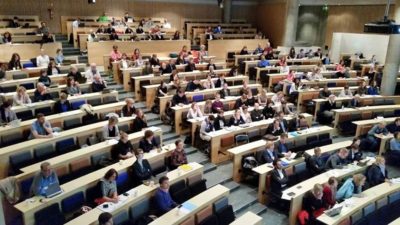May Thorseth og Jostein Brobakk fra Forfood-prosjektet ledet arbeidsgruppe 4 på den nordiske miljøkonferansen NESS 2015. 11 deltakere i arbeidsgruppen behandlet alle verdien av vekst i begrensede systemer.
Den tolvte NESS-konferansen Contested Natures – new strategies, ideas and dialogues ble arrangert i Trondheim av NTNU og Norsk senter for bygdeforskning 9. – 11. juni 2015.
Dette var beskrivelsen av arbeidsgruppen til Thorseth of Brobakk:
Is the Value of Growth in the Antroposcene an Oxymoron?
The idea and concept of growth is currently a central part of important societal and economic processes and models. The quest for growth of products from the fishery and farming sectors shape policy and business strategies, and affect long-term production goals. These goals also spill over to the academic sector through defining research perspectives and questions. In order to meet future demands for food, fiber and energy from an exponentially growing global population we need to increase production levels in both the green and blue sectors. Production in both of these sectors take place within biologically distinct systems, and they are based on input-factors that are limited, such as fresh water and available land areas. In this working group we want to question whether it is it possible to imagine continued growth within limited systems. What moral and ethical considerations do we have to face when deciding on future growth goals within such systems? In line with the content of the emerging bioeconomy we ask if it is possible to envisage these growth projections in a sustainable manner.
In focusing on the green and blue sectors of production, we welcome papers that discuss the concept of growth from various social scientific and humanitarian perspectives, both theoretically as well as empirically based. An issue of particular importance relates to intergenerational sustainability and responsibility towards future generations. This indicates that the value of growth has to be balanced against long-term perspectives on e.g. economics, governance, institutions, motivation and moral responsibility. Whereas Survivalists argue that we have to count on limits of natural resources and are concerned about the tragedy of the commons, Prometheans rather believe in the possibility of technological fixes, along with nature’s own capability of regeneration. Thus, we need to ask whether growth has to presuppose a possibility of overcoming limits with respect to natural resources like clean water and food. We welcome contributions from social scientists as well as from humanitarian disciplines. In combining analysis from the different fields and perspectives mentioned above we hope to shed more light on the relationship between growth as a concept in theories and models, and empirical factors affecting limits to growth.
Organisers:
May Thorseth, Department of Philosophy and Religious Studies/Programme for Applied Ethics, NTNU
Jostein Brobakk, Centre for Rural Research

